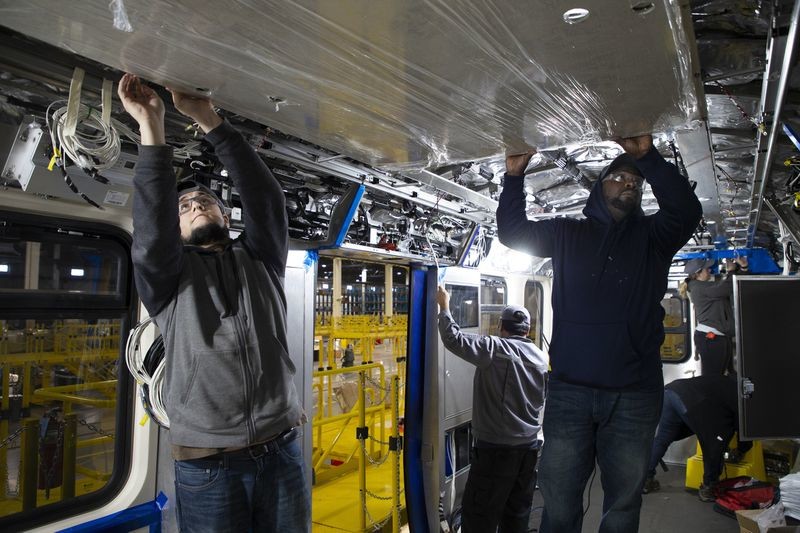Mary Wisniewski | Chicago Tribune
Proposed legislation that would bar transit agencies from using federal money to buy Chinese buses and rail cars has been revised, which could buy a new factory on Chicago’s Far Southeast Side time to land additional contracts and add dozens of jobs.
CRRC Sifang, a subsidiary of a Chinese rail car manufacturer, employs 100 workers at a Hegewisch facility it built to make rail cars for the CTA. It will employ about 70 more once production has ramped up to handle the full $1.3 billion contract. The proposed bipartisan legislation would not affect the current 10-year CTA contract.
CRRC had hoped the plant could also do future work for other transit agencies, including Metra. But the original draft of the proposed legislation, part of the National Defense Authorization Act, would have limited CRRC’s ability to line up additional contracts. The revised proposal delays the start of the ban until two years after Congress passes the legislation, which allows CRRC time to get more contracts, many of which involve years of ongoing production.

Photo taken by Terrence Antonio James from the Chicago Tribune
“The current version of the NDAA ensures public transit agencies will continue to benefit from competition in the passenger rail car industry for at least two years after the NDAA is enacted,” said Marina Popovic, human resources director and chief legal counsel for CRRC Sifang, in a statement.
Popovic said the company is confident that, during the interim period, CRRC “will demonstrate to all transportation stakeholders that CRRC’s railcars are safe, secure and reliable.”
CRRC spokesman Dave Smolensky said in an interview that if the the company was able to get another rail car contract, it would add an additional 100 jobs to its 380,000-square-foot Chicago facility.
The company has already put in bids to build rail cars for other transit systems, including the Washington Metropolitan Area Transit Agency in Washington, D.C., known as WMATA. That agency is kept out of the two-year extension, so CRRC could not get that contract.
CRRC said it has also submitted a bid to Metra, the Chicago region’s commuter railroad, which has been accepting proposals from companies interested in building at least 200 new railcars. Metra had issued an earlier bid for 75 rail cars in April 2017, but only CRRC responded. So Metra decided to try again.
Metra spokeswoman Meg Thomas-Reile said the agency does not comment on active procurements, so as not to compromise the “confidentiality and integrity of the evaluation process.”
The National Defense Authorization Act establishes funding levels and sets policies for national security programs. The final draft must still be passed by both the House and Senate before it can be signed by President Donald Trump.
Advocates for the proposal said that prohibiting federal dollars from being spent on Chinese-made buses and rail cars is necessary to protect the American rail industry from state-subsidized competitors and to guard against spying and sabotage.
U.S. Congresswoman Robin Kelly, a Chicago Democrat whose district includes the Hegewisch factory, had voted for an earlier version of the Authorization Act, which included the original Chinese rail car ban proposal and had bipartisan support.
Kelly is currently reviewing the “massive” bill in its entirety, said her spokesman, James Lewis.
Erik Olson, vice president of the Rail Security Alliance, said the group of American freight rail car companies is “grateful” to all members who have worked on the legislation and is hopeful that it will become law. Members in the group include companies like Greenbrier Companies and TrinityRail of Texas.
“We’re thankful they have recognized the serious national security threat posed by Chinese state-owned enterprises,” said Olson in an emailed statement.
CRRC also faces the possibility that tariffs proposed by the Trump administration on Chinese products could drive up the price of the CTA “L” project, which involves replacing about half of the CTA’s fleet. The CTA has said that CRRC must pay for any new costs caused by the tariffs, but Smolensky said there is still no definitive answer on that question.
CRRC is currently working on the first 10 prototype 7000-series “L” cars. The prototypes won’t go into service on the system for testing until next year, and full production won’t start until those cars are tested.
Smolensky said the company is “optimistic” that the tariff issue will be worked out before the factory goes into full production. The contract is for up to 846 cars.
Last week, the CTA asked CRRC for more details about its supply chain after an NBC news report thatchildren are being used to mine materials in Africa that might be used in “L” car production. CRRC had responded in a statement that the company prohibits the use of child labor in the making of any of the components used in the assembly of its cars, and said that most of the components are sourced from U.S. suppliers.
Source: Chicago Tribune